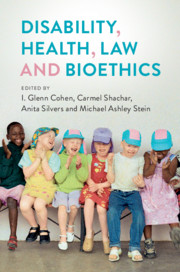Book contents
- Disability, Health, Law, and Bioethics
- Disability, Health, Law, and Bioethics
- Copyright page
- Dedication
- Contents
- Notes on Contributors
- Introduction
- Preface
- Acknowledgments
- Part I Disability: Definitions and Theories
- Part II Disability in the Beginning and the End of Life
- Part III Disability in the Clinical Setting
- Part IV Equality, Expertise, and Access
- Introduction to Part IV
- 11 Making “Meaningful Access” Meaningful: Equitable Healthcare for Divisive Times
- 12 The Privacy Problem in Disability Antidiscrimination Law
- 13 Sexual Agency As a Rights-Based Imperative for Persons with Intellectual Disabilities
- Part V Disability, Intersectionality, and Social Movements
- Part VI Quantifying Disability
13 - Sexual Agency As a Rights-Based Imperative for Persons with Intellectual Disabilities
from Part IV - Equality, Expertise, and Access
Published online by Cambridge University Press: 08 April 2020
- Disability, Health, Law, and Bioethics
- Disability, Health, Law, and Bioethics
- Copyright page
- Dedication
- Contents
- Notes on Contributors
- Introduction
- Preface
- Acknowledgments
- Part I Disability: Definitions and Theories
- Part II Disability in the Beginning and the End of Life
- Part III Disability in the Clinical Setting
- Part IV Equality, Expertise, and Access
- Introduction to Part IV
- 11 Making “Meaningful Access” Meaningful: Equitable Healthcare for Divisive Times
- 12 The Privacy Problem in Disability Antidiscrimination Law
- 13 Sexual Agency As a Rights-Based Imperative for Persons with Intellectual Disabilities
- Part V Disability, Intersectionality, and Social Movements
- Part VI Quantifying Disability
Summary
Long perceived as sexually aberrant, persons with disabilities have made headway in recent years breaking down societal and attitudinal barriers that exclude many from leading sexually active lives. This progress has been uneven, often depending on a person’s type of disability. For example, evolving societal attitudes support the equal right of persons with physical disabilities to sexual intimacy, even if the means by which to fulfill this right (e.g., accessible social clubs) remain elusive. By contrast, persons with intellectual disabilities seeking volitional sex still face multitudinous attitudinal barriers.
Keywords
- Type
- Chapter
- Information
- Disability, Health, Law, and Bioethics , pp. 171 - 182Publisher: Cambridge University PressPrint publication year: 2020

